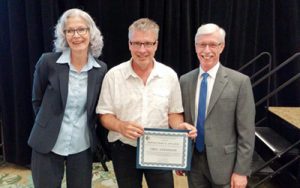The College of New Caledonia and the regional forest industry in central British Columbia have partnered to establish a long-term industrial research chair in forest health. The Natural Sciences and Engineering Research Council (NSERC) has announced a one million dollar grant for CNC, to fund the position for five years. The one million dollars will be supported with $100,000 in funding from the CNC Research Forest Society, $160,000 in funding from industry partners, and an additional $2,000,000 of in-kind funding from numerous partners as well. The position will be filled by Richard Reich, a CNC Natural Resources and Environmental Technology (NRET) instructor.
Reich will work closely with forest companies and collaborating scientists, from government and the post-secondary sector, to develop innovative tools that will help mitigate the impacts of forest diseases on the productivity and resilience of young managed forests in British Columbia.
Over the past twenty-six years, Reich has conducted extensive research and development in forest pathology. His focus as chair will be on initial research related to stem rust diseases on lodgepole pine trees and armillaria root disease. These diseases are rapidly increasing in some regions of the province and pose serious business and management challenges to the forest industry. The chair will also work with small- and medium-sized companies that develop technology-based geospatial solutions for the forest sector. This technology is used to remotely detect forest health problems using unmanned aerial vehicles and high-resolution digital imagery.
The Chair’s research activities will involve faculty, staff and students from the College’s NRET program, Biology program and other educational programs. Students involved in this research will learn innovative technologies in the fields of forest health, silviculture, unmanned aerial vehicles, geographic information systems and remote sensing. This will provide students with the enhanced skillsets necessary to foster innovation in the Canadian forest sector.
Quotations:
Mike Morris, MLA for Prince-George-Mackenzie
“Biodiversity is key to the preservation of a healthy forest. The establishment of a research chair will focus our efforts to sustain biodiversity and preserve our forests for generations to come.”
Shirley Bond, MLA for Prince George-Valemount
“Advances in technology are making it possible to manage our forests more efficiently and effectively,” said MLA Shirley Bond. “This initiation will help us identify potential problems in advance and help avoid potential threats to forest health. This is an important investment in applied research at CNC. Congratulations on this significant partnership.”
Frank Varga, general manager of Comfor Management Services Ltd.
“I have had the opportunity work with Richard on multiple projects in the past, and as the new Community Forest Manager for Burns Lake Community Forest, I am looking forward to working with Richard on future projects. The forest industry is focused on protecting our mid-term timber supply, and the research projects led by Richard and CNC students are critical to developing innovative solutions that ensure the health and resilience of our managed forests.”
Ralph Hausot, Canfor representative and chair of the research forest society
“Richard’s proven track record working with government and industry on urgent forest health issues positions him well for the position of Industrial Research Chair. Innovation in managing our forests requires strong collaboration with industry, government, First Nations, and community stakeholders. By engaging NRET students in this applied research collaboration, Richard is developing the skilled Natural Resource and Environmental Technologists urgently needed in the forestry and other natural resource sectors.”
Richard Reich, industrial research chair
“I am really looking forward to serving as the industrial research chair. This is a great opportunity to develop the partnership between our industrial and educational sectors. CNC students will receive practical benefits by learning about industry specific issues and by helping create solutions to these challenges. Our industry partners will, in exchange, benefit from the practical applications that this research will create. Getting to be in the center of all that is very exciting.”
Pierre Lapointe, president and CEO of FPInnovations
“FPInnovations welcomes the opportunity to collaborate with CNC’s NSERC Industrial Research Chair in Forest Health. Developing remote sensing technologies that effectively detect forest health factors in BC’s managed forests is key to mitigating the potential impact of climate change and managing a sustainable long-term timber supply in the province and elsewhere.”

